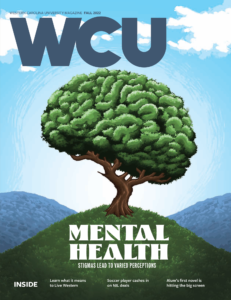
Addressing mental health among all ages is important but especially on campuses after COVID-19. Western Carolina University is also noticing an increased need for addressing mental health.
The Director of WCU Counseling and Psychological Services, Kim Gorman, said for WCU Magazine’s special issue on Mental Health that CAPS has a slight increase of students seeking its services. A lot of those are students reporting trauma, which she believes is an outcome of the pandemic, such as parents losing jobs, the financial implications and multiple deaths that occurred. With the increased need for awareness, WCU decided that the theme for the 2022-2023 year is mental health and wellness.
Even with the extra attention towards mental health, there are issues that don’t get relayed to staff and don’t receive proper attention according to interviewed students. One of which is eating disorders.
Six WCU students said they personally struggle with an eating disorder and know someone personally that also struggled with this issue. Only one of these students agreed to talk on the record with us about her struggles.
Listen to the podcast below with Bay Clark and her experience.
All of the students I talked to said that they think eating disorders are an issue at Western that needed more attention from staff that comes into direct contact with students such as Residential Assistance and advisors.
Kellie Monteith, the Associate Vice Chancellor for Health and Wellness at WCU, said there wasn’t a way to get an exact number or rate for this issue because of doctor-patient confidentiality laws.
“It would be up to a counselor to come to me and say that they see a real issue on campus and then we would take it from there, but that is at the discretion of the counselor,” said Monteith.
She added that “students would have to see an on-campus counselor or sign a release for their private counselor for us to ever know they were struggling.”
Even so, Monteith stated that she has seen a number of students struggling with disordered eating but didn’t say that she viewed it as a prominent issue. “I am aware of students struggling with ED every semester,” she said.
WCU triple major, Bay Clark, is one of the students who is not talking with CAPS about her ED. “I personally did not reach out to anyone on campus just because I felt that it was something at the time that I had to deal with alone and something I couldn’t talk about; something that wasn’t socially regular,” Clark said.
From every student interviewed, all had the opinion that the mental health counselors are overbooked and the waiting period for an appointment is too far out to help students effectively. Monteith’s response was that they have multiple resources for same-day appointments for students in crisis.
“We have four counselors on staff that do same day appointments as well as several points of entry to get students down for an appointment like first aid services and even me. I am a point of entry for students to get help,” she said.
As mental health awareness grows, so will the students’ demands on the services to better mental health standings.



